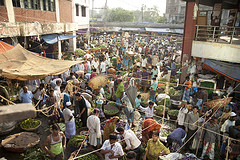MOTIVATION
The Bangladesh Policy Research and Strategy Support Program for Food Security and Agricultural Development, funded by USAID, is the largest project IFPRI has ever had in Bangladesh. Building on previous work in the country alongside government partners in the Ministry of Food and Disaster Management and the Ministry of Agriculture, IFPRI launched the program in October 2010. PRSSP fills the need for demand-driven food and agriculture research in response to Bangladesh’s country investment plan for agriculture, food security, and nutrition. It aims to generate information on critical issues, strengthen analytical capacity within the country, and stimulate policy dialogue. Its main objectives are to provide policy options and advisory services, collaborate with national institutions to evaluate and explain evidence, and find effective ways to deliver options and evidence to decision makers and stakeholders.
RESULTS AND OUTCOMES
The Bangladesh PRSSP has been engaging in various research and capacity strengthening activities since its inception.
- In 2012, IFPRI designed a two-year experimental pilot program called the Transfer Modality Research Initiative (TMRI), which was implemented by the World Food Programme (WFP). IFPRI evaluated the impacts of five types of social safety-net transfers on income, food security, and child nutrition for the 4,000 ultra-poor women and their 21,600 family members who received substantial benefits from 2012 to 2014. PRSSP’s assessment, supported by USAID and the Swiss Agency for Development Cooperation, showed that the combination of cash or food with nutrition education improves children’s nutrition. The TMRI led to an unprecedented decrease in child stunting by 7 percentage points over the project period—an achievement almost three times the national average decline.
- During consultations for the 2016 National Nutrition Plan of Action (NPAN), UNICEF and World Bank missions in Bangladesh referenced TMRI findings to highlight the importance of nutrition education in improving children’s nutrition.
- Bangladesh’s National Food Policy Plan of Action and Country Investment Plan Monitoring Report 2015 recommended that nutritional education be incorporated into the country’s National Social Protection Strategy, drawing from the TMRI results. The country’s 7th Five Year Plan (2016– 2020) also referenced the initiative’s findings to support the integration of nutrition education into social safety-net programs.
- PRSSP developed the Bangladesh Integrated Household Survey (BIHS) in 2011, the most comprehensive and nationally representative rural household survey, which collects critical poverty, nutrition, food security, gender (using the Women’s Empowerment in Agriculture Index), and other data from 6,500 participating households. A part of the survey was designed to track the progress of USAID’s Feed the Future program.
- In estimating the impact of the Feed the Future program in Bangladesh, the BIHS dataset was instrumental in showing the nearly 16 percent reduction in poverty from 2011 to 2015 within Feed the Future zones of influence in Bangladesh, according to USAID’s 2015 Feed the Future progress report.
- The BIHS dataset was also used by the World Bank to prepare a US$500 million loan agreement with the Government of Bangladesh to improve the ability of its safety-net system to reach the poorest and most vulnerable population.
- In 2014, PRSSP, with support from USAID, the IFPRI-led CGIAR Research Program on Agriculture for
Nutrition and Health (A4NH), and Helen Keller International (HKI), designed an experimental project on
Agriculture, Nutrition, and Gender Linkages (ANGeL) in order to identify actions and investments in agriculture
that can leverage agricultural development for improved nutrition, and make recommendations on how to invigorate pathways to women’s empowerment. The Ministry of Agriculture in Bangladesh, which is executing the project, plans to use project findings to design, implement, and scale up the most effective countrywide interventions to improve nutrition and women’s empowerment. - IFPRI researchers worked with the Ministry of Agriculture to launch the Agricultural Policy Support Unit
(APSU) in November 2012. This unit supports policy makers by delivering real-time information—for
example, the estimated size of the next rice crop—which is extremely useful for up-to-date, accurate
decision making.- The APSU has delivered valuable research and recommendations for the ministry. In 2016, the unit developed interventions and policies to help improve agricultural productivity and reduce poverty
in the Teesta River Basin region, which covers 14 percent of Bangladesh’s total cultivated area. - In 2014, the APSU, with technical assistance from the PRSSP, successfully prioritized 147 projects with a total budget of US$2 billion from fiscal year 2014/2015 to fiscal year 2018/2019. APSU’s high-quality
report was approved by the Minister of Agriculture and drew the attention of the Prime Minister
- The APSU has delivered valuable research and recommendations for the ministry. In 2016, the unit developed interventions and policies to help improve agricultural productivity and reduce poverty
For more information on IFPRI's research and partnerships in Bangladesh, please go to this brochure.



